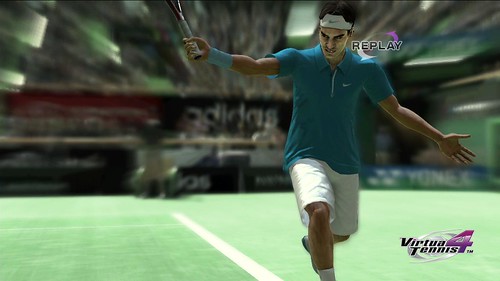As dark clouds have taken residence over London and the weather resembles a certain interactive drama, I don’t think I’ll be stepping onto a tennis court any time soon. Luckily, I have a PlayStation Move motion controller, a 3D TV and an early demo of Virtua Tennis 4 to tide me over.
I recently spoke to the game’s Executive Producer, Mie Kumagai, and asked why she had chosen to develop a tennis game when she served us the first in the Virtua Tennis series, back in 1999.
“When we first started the series, we wanted to make a casual arcade game that everyone could pick up and enjoy,” she said. “Sport seemed like a good place to start because it appeals to many people that wouldn’t usually play games. That was the start of the series, but we reached a point where we were looking for something new; it’s around this time that we heard about PlayStation Move.”

Virtua Tennis 4 lets you step into the shoes of some of the world’s best tennis pros. Every swing of the racquet can be performed with the PlayStation Move motion controller and you can judge the approach of the ball better than ever, thanks to stereoscopic 3D support. I asked Kumagai for her thoughts on Move and her philosophy behind working with a motion controller.
“I saw PlayStation Move at quite an early stage in its development,” she replied, “and I remember being curious about what Sony [Computer Entertainment] had been working on and excited about the new technology.”
“We have two points of consideration when it comes to the game’s controls. The first is that we want the game to be playable without the user having to press any buttons at all; in other words, you are relying entirely on your own movement.”
“The second consideration is to achieve a good balance between first and third person points of view. If we wan the game to be totally realistic, then first person would be the way to go, but that way you kind of lose the fun of controlling top tennis players like Roger Federer, so we have aimed for the right mixture of the two.”

The demo available to play at gamescom (and my desk) features Roger Federer and Andy Murray. Your character’s left and right movement is automatic but each swing of the racquet must be performed by the player and you can drop back or rush to the net by physically stepping back or forward. There’s a dynamic camera system in place, so when the ball is in the other half of the court, the camera pans out so that you can see your position.
When the ball is coming towards you, it glides seamlessly into a first person viewpoint where you can see your racquet in front of you and time your swing accordingly. You can even twist the racquet to adjust its face when it connects with the ball, allowing skilled players to apply spin. It’s accessible and extremely intuitive, especially when playing in stereoscopic 3D.
“The balance between accessibility and realism in very important when it comes to gameplay, but I think that Virtua Tennis with Move has a really good system, where the gameplay and the controls are in perfect sync. Building the game up from this existing system wasn’t too hard for us,” Kumagai added.
Virtua Tennis 4 will be available on PlayStation 3 in Spring 2011.